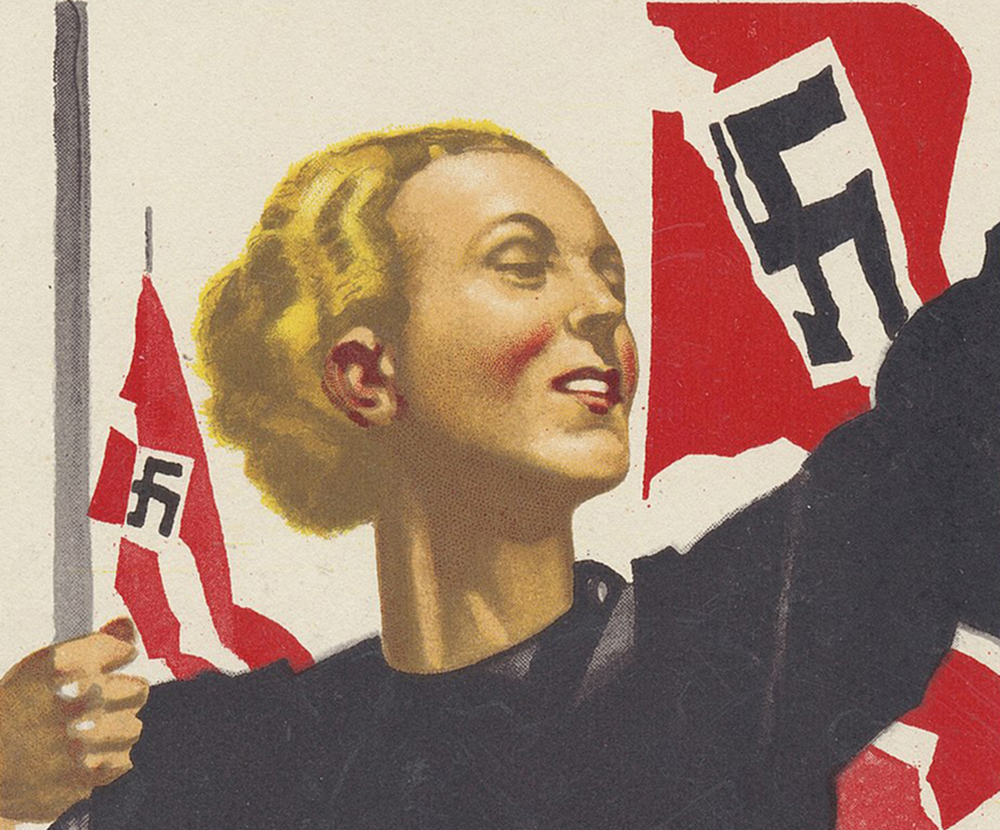Reproducing Nazism
A postgraduate research project exploring the role and complicity of women in National Socialism

Lucy Dixon is a Philosophy of Education PhD student. Her research, supervised by Dr Marie Morgan, is a feminist ethical critique of women’s complicity in Nazism at the intersection of maternity, care and thinking.
When I was an Undergraduate student, figuring out what I wanted to do for my PhD project, I came across a woman called Erna Petri. She was the catalyst which inspired my project. Coming home from the market one day, she saw six Jewish children by the side of the road. She took them home and showed them care. She waited for her high-ranking SS officer husband to come home and ‘deal’ with the children, but when he did not arrive home, she took them out to the woods at the back of her house and shot them one by one while she heard them whimper. While not the main focus of my thesis, Erna inspired me to explore the intersection of maternity, care, thinking and complicity.
My PhD project is situated within the field of Philosophy of Education, as well as Holocaust education/studies and is interdisciplinary by nature. There is a historical body of research focused on experiences of the ‘ordinary Aryan’ women present in academic work particularly from, but not limited to, Boak (2013), Pine (1997), Stephenson (2001) and Lower (2014). This is however exclusively a historical perspective; it has not been elevated to a philosophical level, which asks demanding questions particularly around aspects of care and thinking. These integral questions and philosophical examinations are important in closing the gap in the research, as well as in public understanding about the ‘ordinary’ women who contributed to the Holocaust.
There is a distinction between the philosophical, theoretical approaches to Holocaust Education (in its broadest sense) and Holocaust in its popular sense (e.g., Holocaust Education in schools). Theorists within the field of Holocaust studies will help explore the philosophical, moral and ethical issues the Holocaust raises – which is also where the emphasis of my research lies. The originality of my research can be utilised to bring importance/educational value of studying the ordinary ‘Aryan’ woman and their intersection in complicity to the mainstream discourse of Holocaust Education.
I draw significantly from philosopher and political theorist Hannah Arendt, focusing on her theories around Totalitarianism, the public and private spheres, thinking and non-thinking and the banality of evil. Arendt’s work is rich and wide reaching and is enhanced by the ever-widening body of work produced by Arendtian scholars and commentators. Integrating care ethics, through theorists such as Virginia Held, Eva Kittay and Joan Tronto, into my work, not only enables me to explore aspects such as maternity – which is often built upon the concept of care – but also to comment on and/or critique aspects of Arendt’s work. Care ethics also plays a key role when understanding the role of specific careers in the Third Reich, such as Nursing. Additionally, it is important to me that my thesis aims to draw predominately on the works of female thinkers, as the field of research it is situated in is often ruled by well-known male philosophers.
Public engagement
The theme for Holocaust Memorial Day 2024 is Fragility of Freedom, and to mark this Lucy has recorded a podcast with modern historian Dr Emily Stiles, in which they explore the concept of freedom past and present.
Find out more about how the University of Winchester marks Holocaust Memorial Day.
Read Lucy's blog for Holocaust Memorial Day 2023, of which the theme was Ordinary People.
Contact Lucy: Lucy.Dixon@winchester.ac.uk
